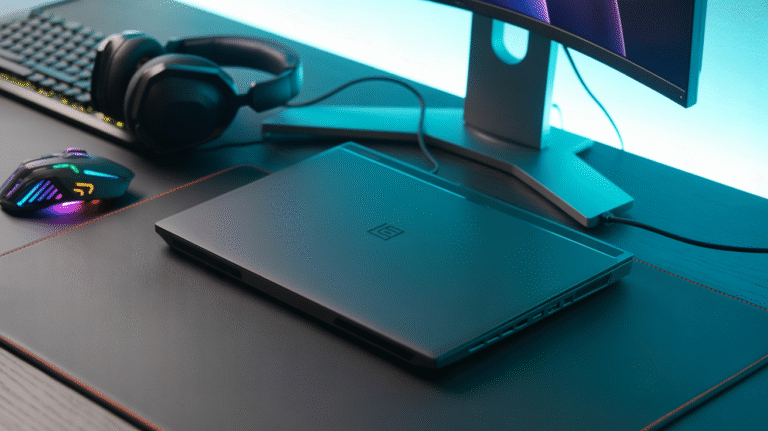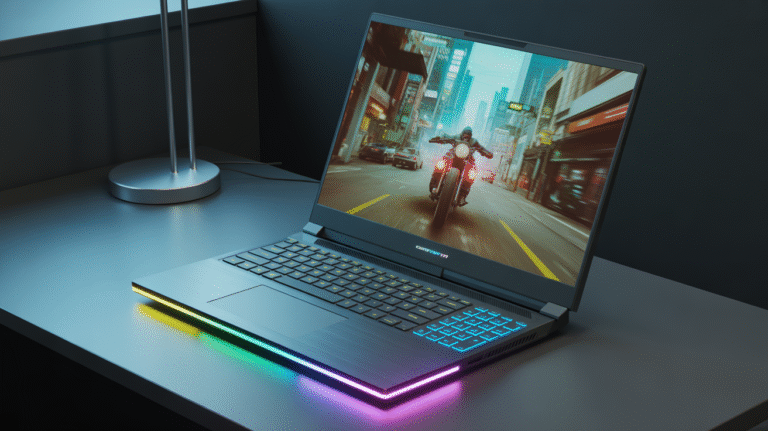The Gamer’s Dilemma
For many aspiring or upgrading gamers, a fundamental question arises: should you invest in a dedicated gaming PC (desktop) or opt for the convenience of a gaming laptop? Both offer the power needed to run modern titles, but they cater to vastly different needs and priorities. This decision isn’t just about performance; it involves considering factors like budget, desired flexibility, future-proofing, and even personal preference regarding setup.
This article aims to cut through the technical jargon and help you understand the core strengths and weaknesses of each option. By examining performance, price, portability, and more, you’ll be equipped to make the choice that best suits your gaming lifestyle and requirements.
Understanding the Gaming PC (Desktop)
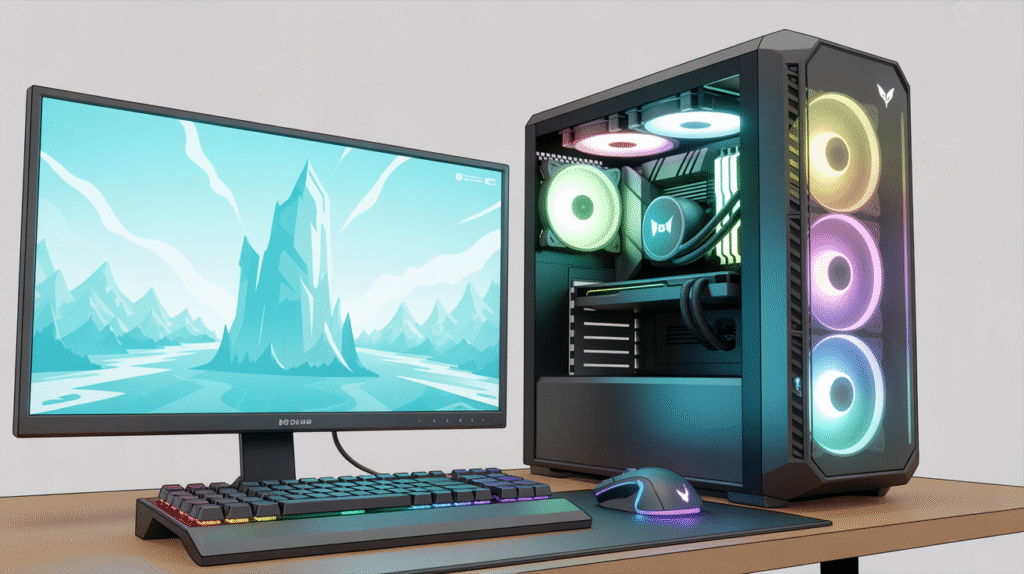
A gaming PC typically refers to a desktop computer explicitly built or configured for playing demanding video games. Unlike standard office desktops, gaming PCs feature powerful, dedicated graphics cards (GPUs), robust processors (CPUs), ample RAM, and fast storage solutions designed to handle high-resolution textures, complex game physics, and rapid loading times. These components are housed within a tower case and require external peripherals like a monitor, keyboard, and mouse to function.
The defining characteristic of a gaming desktop is its modularity. Each major component is a separate part that connects to the motherboard, allowing for easy replacement, repair, or upgrade. This structure is fundamental to its advantages and disadvantages.
Advantages of a Gaming PC

Superior Performance for the Price
Generally, you get more raw gaming performance for your money with a desktop PC compared to a similarly priced gaming laptop. Desktop components, especially GPUs and CPUs, can draw more power and have larger cooling systems, allowing them to run at higher clock speeds for sustained periods. This translates directly to higher frame rates and better graphical settings in games for the same financial investment.
Manufacturers don’t have to cram powerful parts into a tiny chassis, reducing the engineering costs associated with miniaturization and thermal management found in laptops. This cost saving is often passed on to the consumer in the form of better specs at a given price point.
Greater Upgradability and Customization
One of the most significant long-term benefits of a gaming PC is its ease of upgradability. When a new, more powerful graphics card or CPU is released, you can typically swap out the old component and drop in the new one (within compatible limits of the motherboard and power supply). This allows you to keep your system relatively current for years by upgrading parts incrementally.
Beyond performance, desktops offer extensive customization options. You can choose specific cases, cooling solutions (like custom liquid loops), RGB lighting, and even the motherboard itself based on features and aesthetics, allowing for a truly personalized machine.
Better Cooling Solutions
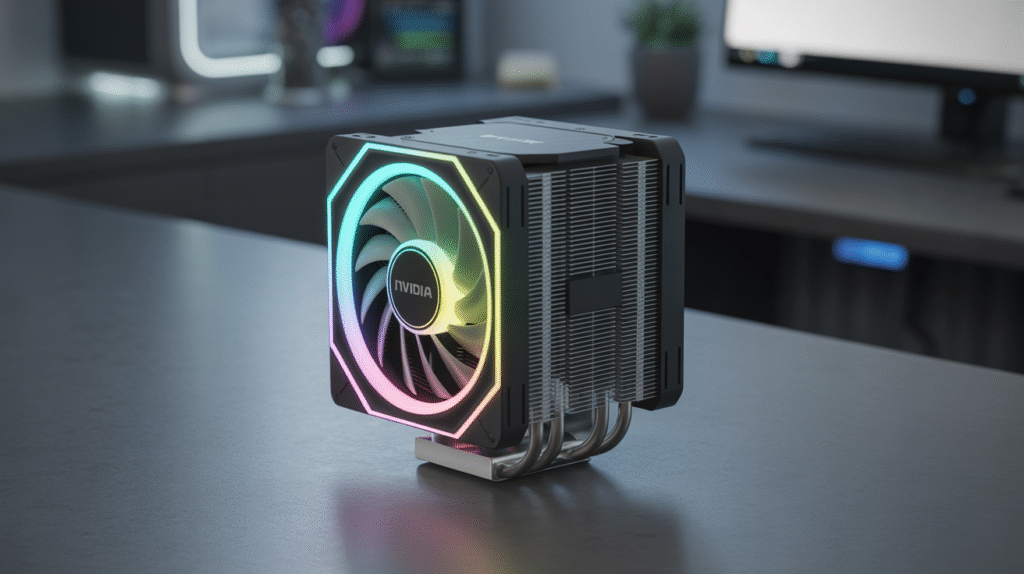
Desktop cases offer significantly more space for airflow and larger heatsinks or radiators compared to laptops. This superior cooling allows components to operate at lower temperatures, preventing thermal throttling (where components intentionally slow down to prevent overheating). Better cooling ensures more stable, higher performance during long gaming sessions and can also contribute to the longevity of your components.
Larger fans and heat sinks in desktops can dissipate heat more effectively and often more quietly than the smaller, faster-spinning fans required in a confined laptop chassis.
Enhanced Ergonomics and Peripheral Choice
A desktop setup provides the ultimate flexibility in creating an ergonomic and comfortable gaming station. You can choose a monitor of any size, resolution, and refresh rate, position it perfectly at eye level, select a mechanical keyboard that suits your typing and gaming style, and use a mouse with your preferred grip and features. You can also select a comfortable gaming chair and desk.
This level of customization isn’t possible with an all-in-one laptop design, where the screen and keyboard are fixed relative to each other. While you can connect external peripherals to a laptop, the core unit’s design still dictates some ergonomic limitations.
Potentially Lower Long-Term Cost
While the initial cost might be similar or slightly lower for comparable raw performance, the long-term cost of ownership can be less for a desktop. Instead of needing to replace the entire machine every few years to keep up with game requirements, you can strategically upgrade individual components as needed. Swapping out a GPU or adding more RAM is far less expensive than buying a brand new gaming laptop.
This modular approach means your initial investment in the case, power supply, and other less frequently upgraded parts can last through multiple generations of core components.
Disadvantages of a Gaming PC

Lack of Portability
The most glaring drawback of a gaming PC is its complete lack of portability. Once set up, it’s essentially tied to that location. Moving it requires disconnecting everything, packing it carefully, transporting it, and setting it all up again, which is impractical for frequent relocation.
If you need to game or use high-performance applications in multiple locations – whether at home, work, school, or while traveling – a desktop is not a suitable primary device.
Requires External Peripherals
Unlike a laptop, a gaming PC requires separate purchases for essential peripherals to even turn it on and use it. You need a monitor, keyboard, and mouse at minimum. Speakers or headphones are also necessary for audio.
These additional costs add to the initial investment and can take up significant desk space, potentially contributing to a more cluttered environment compared to a single laptop unit.
Takes Up More Space
A full desktop setup involves not just the tower itself but also a monitor, keyboard, and mouse, all requiring dedicated space on a desk. The tower often sits on or beside the desk, taking up floor or desk real estate.
This setup occupies significantly more physical space than simply opening and using a laptop, which might be a concern for users in smaller rooms or with limited desk area.
Understanding the Gaming Laptop
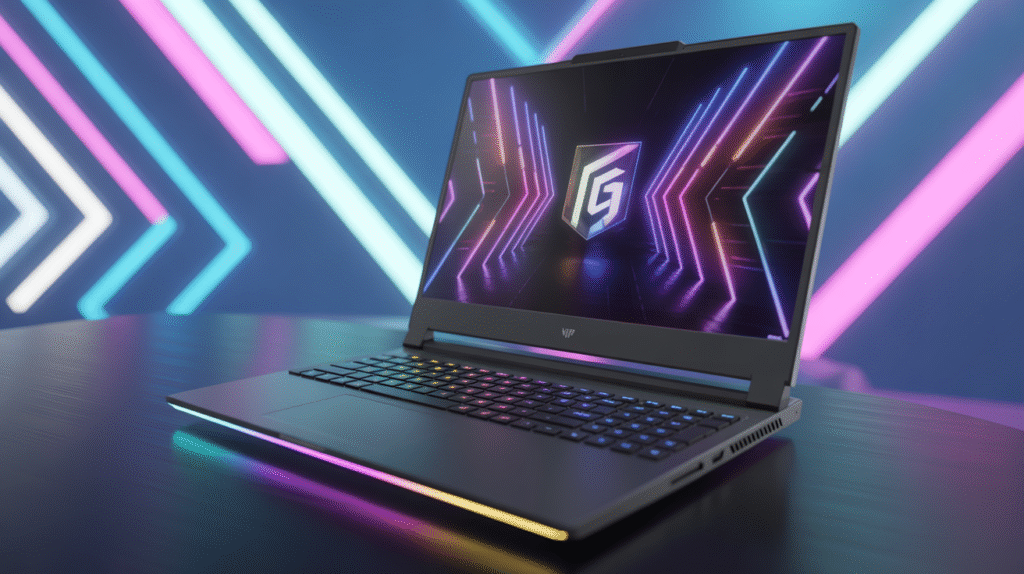
A gaming laptop is a portable computer designed to deliver a gaming experience similar to a desktop, featuring powerful processors, dedicated graphics cards (though typically lower wattage/performance versions than desktop counterparts), and often high-refresh-rate displays built into the lid. It combines all essential components – screen, keyboard, trackpad, speakers – into a single, mobile package.
The core appeal of a gaming laptop lies in its portability. It allows users to game, work, and consume media from virtually any location with a power outlet (as heavy gaming quickly drains the battery).
Advantages of a Gaming Laptop

Excellent Portability
The primary and most compelling advantage of a gaming laptop is its portability. You can pick it up, put it in a bag, and game or work from anywhere – a coffee shop, library, friend’s house, different rooms in your home, or while traveling.
This all-in-one mobility makes it ideal for users who need a single device for multiple purposes across different locations, such as students, business travelers, or those who frequently visit friends for LAN parties.
All-in-One Solution
A gaming laptop is a self-contained unit. You don’t need to buy a separate screen, keyboard, or mouse to get started (though many users connect external peripherals for a better gaming experience when stationary).
This means it’s ready to go straight out of the box, offering convenience and reducing the initial complexity and potential additional costs of acquiring separate components. It simplifies setup and minimizes clutter compared to a full desktop rig.
Disadvantages of a Gaming Laptop

Higher Price for Performance
Gaming laptops often come with a higher price tag for comparable performance to a desktop. Miniaturizing powerful components, designing effective cooling for a thin chassis, and integrating everything into a single unit adds significant cost. You pay a premium, sometimes referred to as the “laptop tax,” for the portability.
A laptop with an RTX 4070, for instance, will typically be more expensive than a desktop build with an RTX 4070, and the desktop version of the GPU will likely perform better due to fewer power and thermal constraints.
Limited Upgradability
Upgradability is severely restricted in gaming laptops. While you can usually replace or add RAM and storage drives (SSDs/HDDs), the CPU and GPU are almost always soldered directly onto the motherboard.
This means that for significant performance boosts, you typically need to replace the entire laptop. This limited lifespan for staying competitive with new games is a major drawback compared to desktops where you can upgrade components piecemeal.
Thermal Throttling and Noise
Cooling powerful components in a thin laptop chassis is a significant engineering challenge. Gaming laptops often struggle with heat dissipation, leading to thermal throttling during intense gaming sessions. This means the CPU and/or GPU will intentionally reduce their performance (clock speeds) to prevent overheating, resulting in lower frame rates than the hardware is theoretically capable of.
To combat heat, laptop fans spin very fast, which can generate considerable noise under load. This can be distracting during gameplay and may require using headphones.
Ergonomic Limitations
While you can connect external peripherals, using the built-in keyboard and trackpad for extended gaming is often less comfortable and precise than using full-sized desktop peripherals. The integrated screen’s height and distance are fixed relative to the keyboard, potentially leading to poor posture and discomfort over time.
Achieving a truly ergonomic setup requires external accessories, which somewhat diminishes the “all-in-one” advantage when gaming seriously.
Shorter Lifespan (Compared to Upgraded Desktops)
Because the core performance components (CPU, GPU) cannot be upgraded, a gaming laptop’s ability to run the latest games at high settings is finite. As new, more graphically demanding games are released, the laptop will eventually struggle to keep up, requiring a full system replacement much sooner than a desktop that can receive component upgrades.
While the laptop itself might still function, its lifespan as a competitive gaming machine is generally shorter than that of a desktop that is regularly upgraded.
Integrated Display Limitations
Though gaming laptop displays have improved significantly, offering high refresh rates and good color accuracy, they are fixed in size and resolution. You don’t have the flexibility to easily swap to a larger 4K monitor or an ultrawide display like you do with a desktop.
While you can connect external monitors to a laptop, you are still relying on the laptop’s internal GPU to drive it, and the built-in screen remains part of the package, adding to the cost.
Direct Comparison: Performance
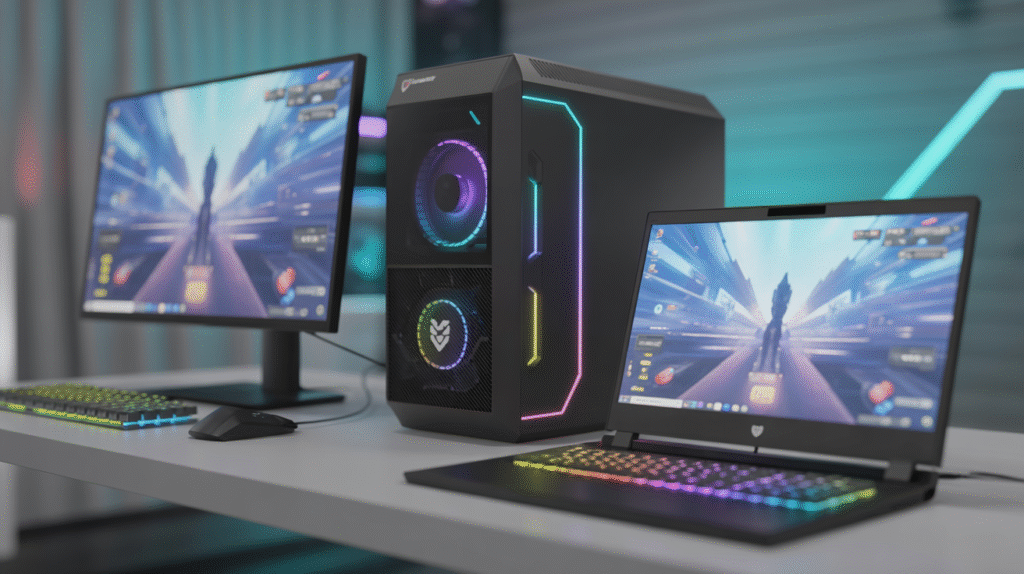
| Feature | Gaming PC (Desktop) | Gaming Laptop | Notes |
|---|---|---|---|
| Raw Power | Generally Higher (for price) | Generally Lower (for price) | Desktop components have higher power/thermal limits. |
| Sustained Perf. | Excellent (due to better cooling) | Can suffer from thermal throttling | Desktops maintain high performance longer under load. |
| Future Proofing | High (via component upgrades) | Limited (CPU/GPU often not upgradable) | Desktops can stay relevant longer with upgrades. |
| Benchmarks | Typically leads for the same generation component names | Often trails desktop versions of same component names | E.g., Desktop RTX 4070 performs better than Laptop RTX 4070. |
For pure gaming power and the highest possible frame rates at a given budget, the desktop usually wins. Desktop components aren’t restricted by the same size and thermal constraints as their laptop counterparts, allowing them to operate more powerfully. While a high-end gaming laptop can be very powerful, a desktop of the same price will almost always outperform it in games.
Direct Comparison: Price and Value

When evaluating price and value, it’s crucial to consider performance per dollar and long-term costs. Desktops offer superior performance per dollar for the initial purchase of the core system unit. Even when factoring in the cost of necessary peripherals like a monitor, keyboard, and mouse (which can add several hundred dollars), a desktop setup often provides better gaming power for the total initial investment compared to a similarly priced gaming laptop.
Furthermore, the long-term value proposition favors desktops due to their upgradability. Instead of replacing an entire $1500-2000+ laptop every 4-6 years to keep up, you might spend \300-$600 every few years on a new GPU or CPU for a desktop, extending its useful gaming life significantly at a lower overall cost over a decade.
Direct Comparison: Portability and Flexibility

This is where gaming laptops clearly dominate. Their defining feature is the ability to move computing power wherever you need it. If you game in multiple rooms, travel frequently, or need a single powerful machine for work/school and gaming on the go, a laptop is the undisputed winner.
A desktop offers zero inherent portability. Its flexibility lies only in its internal configuration and the ability to connect various external devices at a single location.
Direct Comparison: Upgradability and Maintenance
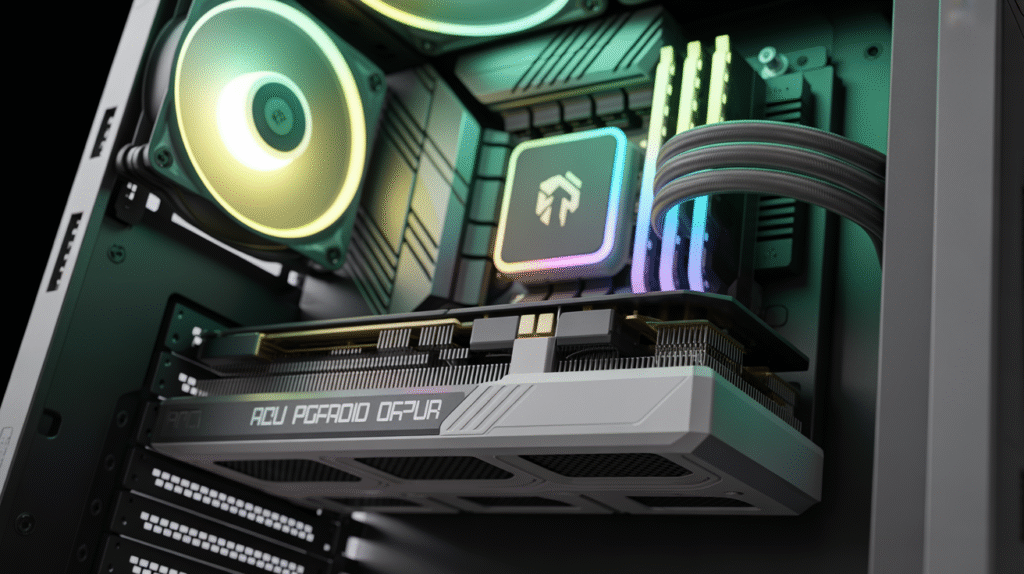
Desktops are vastly superior in terms of upgradability and ease of maintenance. Swapping components like the GPU, RAM, storage, power supply, or even the CPU (within socket compatibility) is relatively straightforward for most users. This allows for significant performance boosts and extending the life of the system.
Maintenance tasks like cleaning dust from fans and heatsinks are also much easier in a spacious desktop case. Laptops, in contrast, are difficult to open, and many components are soldered, making upgrades beyond RAM and storage impossible for most users. Cleaning can also be more challenging.
Direct Comparison: Display and Peripherals
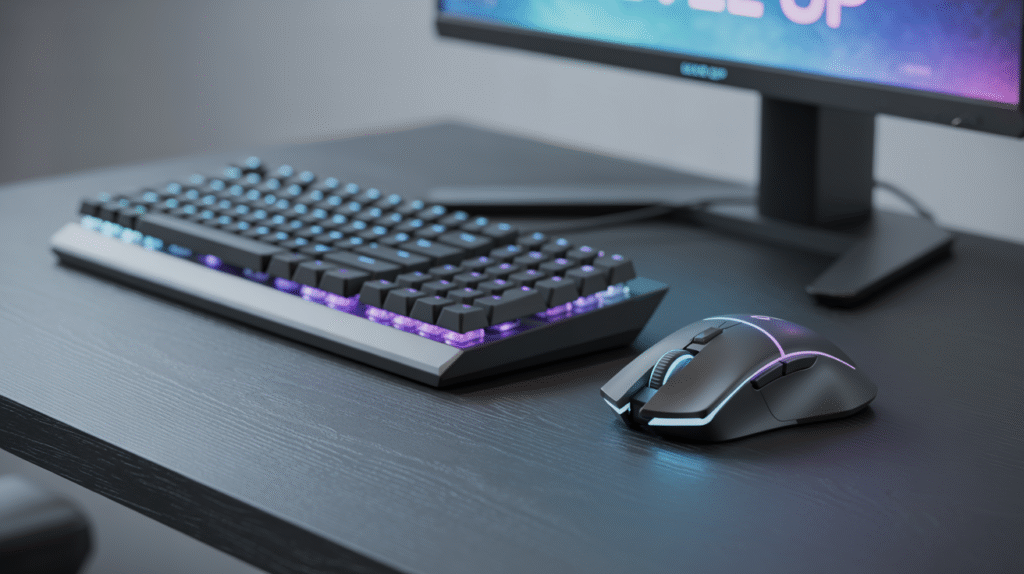
With a desktop, you have unlimited choice when it comes to displays and peripherals. You can select a monitor based purely on your needs and budget – whether it’s a massive 4K screen, a super-high 360Hz refresh rate panel for competitive gaming, an ultrawide display for immersion, or a color-accurate screen for creative work. You can also pick any keyboard, mouse, or audio setup.
While gaming laptops have improved displays, offering high refresh rates and decent quality, you are limited to the screen size and specifications the manufacturer includes. Connecting external monitors is possible, but it adds to the setup and cost.
Direct Comparison: Cooling and Noise
Desktops have a distinct advantage in thermal management due to larger cases, more fans, and the possibility of advanced cooling solutions like large air coolers or liquid cooling systems. This results in lower operating temperatures, less performance degradation over time due to heat, and generally quieter operation under load compared to gaming laptops.
Gaming laptops, confined to a small space, struggle to dissipate heat. Their cooling systems, while advanced for their size, often result in components running hotter and require fans to spin very fast and loudly during intensive tasks to prevent overheating and throttling.
Who Should Buy a Gaming PC?
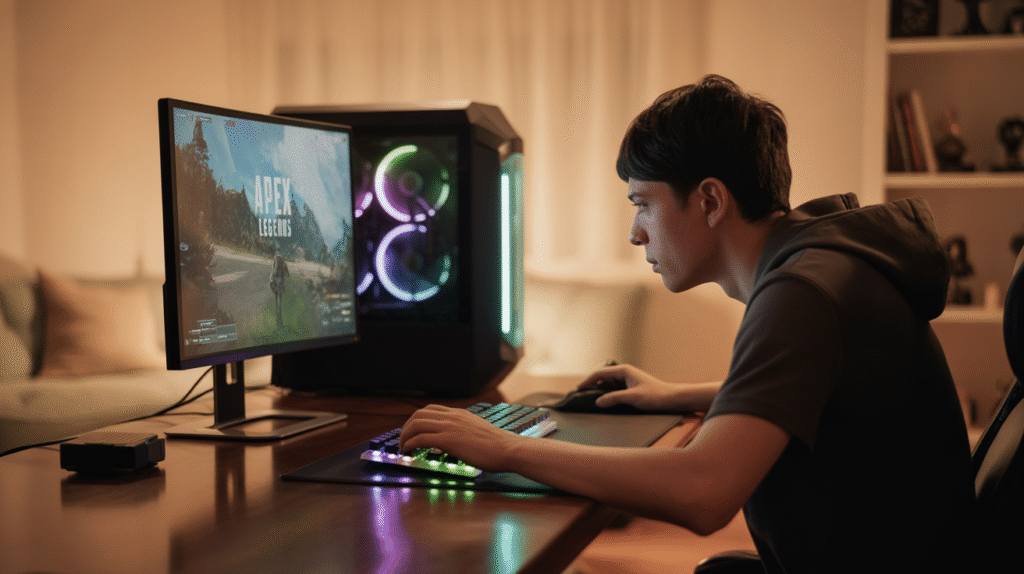
A gaming PC is the ideal choice if:
- You primarily game or use demanding applications in a single location.
- You want the absolute best performance for your budget.
- You value long-term cost savings through component upgrades.
- You enjoy customizing or building your own computer.
- You prioritize optimal cooling, lower noise levels, and maximum ergonomic flexibility.
- You are a content creator or professional who needs the most powerful hardware possible.
Click here to view the best gaming desktop list of 2025
Who Should Buy a Gaming Laptop?

A gaming laptop is the better option if:
- You need to game or use powerful software in multiple locations frequently (e.g., student, traveler, someone who moves between homes).
- You value the convenience of an all-in-one, portable device.
- You have limited space for a full desktop setup.
- You prioritize portability over maximum possible performance per dollar or extensive upgradability.
- You need a single machine for both demanding work/study and gaming.
Click here to view the best gaming laptop list of 2025
Making Your Decision: Key Factors to Consider
To make the right choice, honestly evaluate your priorities based on these key factors:
- Budget: How much are you willing to spend, both initially and over the long term? Desktops offer better performance scaling with budget and cheaper future upgrades.
- Importance of Portability: Do you need to game away from a fixed location regularly? If yes, a laptop is likely essential. If no, a desktop offers significant advantages.
- Desired Performance Level: Are you aiming for maximum frame rates and highest settings, or are you comfortable with a balance for portability? Desktops generally lead in raw performance.
- Willingness to Upgrade/Maintain: Are you comfortable opening a computer case and swapping parts? Desktops are designed for this; laptops are not.
- Available Space: Do you have room for a tower, monitor, keyboard, and mouse setup?
- Preferred Ergonomics: Do you want complete control over your display and input devices, or is an integrated setup acceptable (perhaps with external peripherals added later)?
Conclusion: Finding Your Perfect Fit
Ultimately, the decision between a gaming PC and a gaming laptop boils down to a fundamental trade-off: maximum performance, value, and upgradability versus portability and convenience. Neither is inherently “better” than the other; the superior choice is the one that best aligns with your personal needs, budget, and how and where you plan to game.
If you’re a homebody gamer seeking the most power for your money and enjoy tinkering with hardware, the gaming PC is likely your champion. If you’re always on the move and need a single, powerful machine that can travel with you, the gaming laptop is the clear winner. By carefully considering the pros and cons of each, you can confidently select the gaming platform that will provide you with the most enjoyment and value for years to come.
FAQs: Gaming PC vs Gaming Laptop
Q1: Which is more cost-effective in the long run: a gaming PC or a gaming laptop?
A: Generally, a gaming PC offers better long-term value due to its superior upgradability. You can extend its lifespan with component upgrades like a new GPU or CPU instead of replacing the entire system, which often makes it more economical over several years. However, initial costs may be comparable or higher depending on the specs you choose.
Q2: Can I upgrade a gaming laptop later?
A: Upgradability in gaming laptops is limited. Typically, you can upgrade the RAM and storage, but most internal components like the CPU and GPU are soldered onto the motherboard, making upgrades nearly impossible for most users. For significant performance improvements, replacing the entire laptop is usually necessary.
Q3: Which offers better gaming performance: a desktop or a laptop?
A: Desktops typically provide better gaming performance because they can house more powerful components with better thermal management. They can sustain higher clock speeds longer and often outperform laptops with similar component models.
Q4: Is a gaming laptop suitable for professional tasks besides gaming?
A: Yes, powerful gaming laptops often feature high-end CPUs and GPUs suitable for tasks like video editing, 3D rendering, and other demanding creative workflows. Their portability makes them versatile for both gaming and professional use.
Q5: How important is cooling in choosing between a gaming PC and a gaming laptop?
A: Cooling is crucial. Better cooling in desktops often results in quieter operation and more stable performance over long gaming sessions. Laptops, due to their size constraints, may throttle performance when overheating, leading to less consistent gameplay.
Q6: Can I use a gaming laptop as a desktop replacement?
A: For many users, yes. Gaming laptops can be connected to external monitors, keyboards, and mice, creating a semi-desktop setup. However, they will still lack some upgradeability and cooling capacity of a full desktop.
Q7: Which one is better for competitive gaming?
A: For competitive gaming, a desktop generally offers more consistent high frame rates, better cooling, and the ability to upgrade components as needed. However, if portability is essential, a high-end gaming laptop with high refresh rate display can still perform well.
Q8: Are gaming laptops more prone to hardware failure?
A: Laptops can be more susceptible due to their compact design, which limits airflow and cooling. Over time, high temperatures can accelerate hardware wear. Regular maintenance and choosing quality models can mitigate this risk.
Q9: Which option is better for a student or someone with a tight schedule?
A: A gaming laptop is typically better for students or busy individuals who need portability and quick setup. It allows gaming in dorms, libraries, or on the move without the need for extra peripherals or dedicated workspace.



